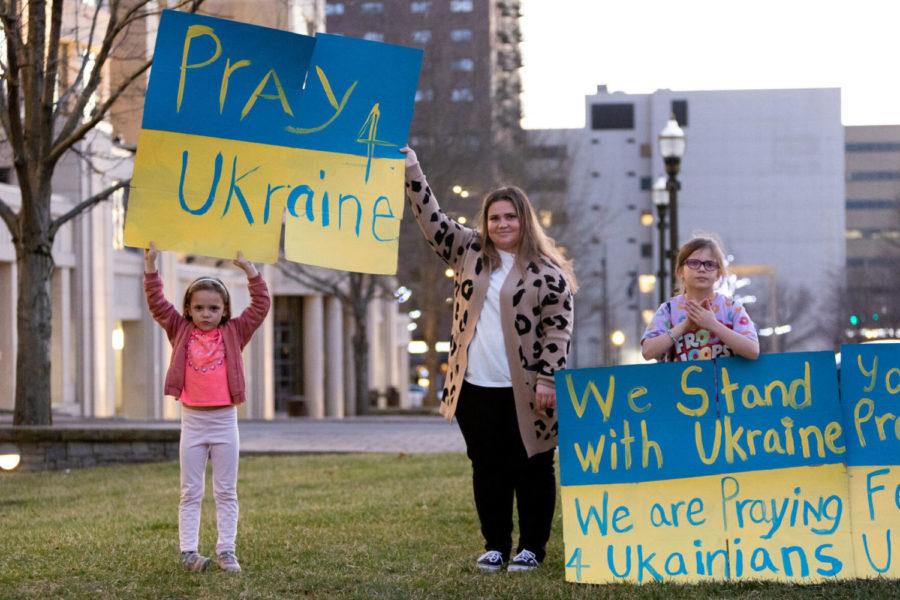A student perspective on Russia-Ukraine
People hold up signs during a gathering in support of Ukraine on Wednesday, March 2, 2022, at Courthouse Plaza in Lexington, Kentucky. Photo by Jack Weaver | Staff
March 3, 2022
Ukraine and Russia are currently clashing in a conflict. There have been no outside troops involved so far, but the North Atlantic Treaty Organization (NATO) has put extreme sanctions in place against Russia.
The actions taken “target nearly 80 percent of all banking assets in Russia and will have a deep and long-lasting effect on the Russian economy and financial system,” according to the Public Relations Department of the U.S. Department of the Treasury.
These actions do not take place in a vacuum, though. Russia is the world’s biggest exporter of wheat. It is also the second largest exporter of crude and refined petroleum and the fourth largest exporter of petroleum gas.
Petroleum is the base of transportation fuel, asphalt, road oil, fuel for heating and electricity generation. It is one of the basic materials for making the chemicals, plastics and synthetic materials that are in nearly everything consumers use.
The world consumed, in total, about 96.5 million barrels of oil daily in 2021, according to the International Energy Agency.
According to the U.S. Energy Information Administration, the U.S. consumed about 19.78 million barrels of oil daily in 2021.
With Russia, who produces about 12% of the world’s global oil, so heavily sanctioned, prices of gas are skyrocketing quickly. This has an immediate effect on the U.S. as a whole.
“Gas prices already went up, literally in a matter of two days they went from $3.29 to $3.49,” junior Tasia Chapman said. “With other countries standing behind Ukraine, I think it’s important, but I think it’s going to have a negative impact on the economy and in world history in general … Russia holds a lot of resources that different nations use, and if people go against Russia, who’s to say they aren’t going to go back against us and go, ‘Well, you can’t use our resources.’”
There have been massive evacuations from Ukraine; over 500,000 refugees have fled to neighboring countries since Feb. 28, according to the head of the UN Refugee Agency.
This mass movement is likely going to cause a change in refugee procedures going forward. With a precedent in place of these countries opening their borders so quickly, if there is a similar situation, questions will arise of if that speed will happen again, and why that might not happen.
This mass immigration also raises questions about racism in Europe. Thousands of African students have been denied exit from the country, specifically because of their race.
“Africans had to figure out other ways to leave … so it’s kind of like, as a minority, it’s like dang, I’m over here in America feeling sorry for them, but then y’all are being discriminatory to people who look like me, even amidst y’all’s circumstances,” Chapman said.
Social media has been prominent in exposing these issues, with TikTok and Twitter spreading the news extremely fast. Ukraine is also using this to their advantage, using their Twitter to increase attention towards their situation.
“It’ll be the most well-documented war we’ve ever seen. People literally have phones in their pockets. I mean, you have TikTok videos of troops … so I think this will change how war is documented, and how we view the war, especially once it’s over,” junior Karter Luttrell said.
The invasion of Ukraine is the largest mobilization of forces in Europe since World War II. Putin mobilized his forces in response to Ukraine’s desire to join NATO. Some of his demands for ending the invasion of Ukraine are Ukraine never joining NATO and the retraction of NATO forces and military infrastructure from member states in the east, which are Central and Eastern Europe and the Baltics.
These demands have been met with negative responses, but further negotiations are in the works.































































































































































